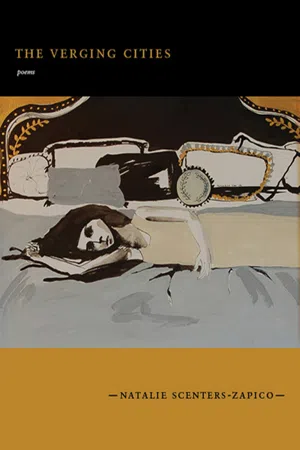
The Verging Cities
Natalie Scenters-Zapico
- English
- ePUB (disponibile sull'app)
- Disponibile su iOS e Android
The Verging Cities
Natalie Scenters-Zapico
Informazioni sul libro
From undocumented men named Angel, to angels falling from the sky, Natalie Scenters-Zapico's gripping debut collection, The Verging Cities, is filled with explorations of immigration and marriage, narco-violence and femicide, and angels in the domestic sphere. Deeply rooted along the US-México border in the sister cities of El Paso, Texas, and Cd. Juárez, Chihuahua, these poems give a brave new voice to the ways in which international politics affect the individual. Composed in a variety of forms, from sonnet and epithalamium to endnotes and field notes, each poem distills violent stories of narcos, undocumented immigrants, border patrol agents, and the people who fall in love with each other and their traumas.The border in Scenters-Zapico's The Verging Cities exists in a visceral place where the real is (sur)real. In these poems mouths speak suspended from ceilings, numbered metal poles mark the border and lovers' spines, and cities scream to each other at night through fences that "ooze only silt." This bold new vision of border life between what has been named the safest city in the United States and the murder capital of the world is in deep conversation with other border poets—Benjamin Alire Saenz, Gloria Anzaldúa, Alberto Ríos, and Luis Alberto Urrea—while establishing itself as a new and haunting interpretation of the border as a verge, the beginning of one thing and the end of another in constant cycle.
Domande frequenti
Informazioni
CON/VERGE
CROSSING
but for a hair stuck in the laminate by his date of birth. Not noticeable,
and I expect there to be an explosion—for the streets to glow red.
but the traffic is alive. It’s still a city, I say. Let’s go to a bar, he says.
and leave at 3:00 a.m. I stumble in my platform heels and stop
I turn litterbug and throw our empties into the ink-stained street.
the bridge back to El Paso. Cameras every ten feet—we smile
murder capital of the world? Border agents wave us across—
No one says a word—we all breathe pollution. To think we didn’t need
we laugh and agree to cross again next weekend. We wonder
how two cities are split, how they swell. Watch how they collide.
HOW BORDERS ARE BUILT
In your hair a crown of border patrol point their guns at me; they watch
with night vision goggles to see if I’ll wade across our river. I lick
could take them down while you’re on top of me, put them in a box somewhere.
I tell you I am desert: my face cracks; reptiles hide in my shadows; my hair grows
in dust storms. I cough as you push your shoulder into my mouth. My eyes
closed, I can feel the brush that grows along your arms reach for the sun.
down my neck and across my body. I flood until you are swallowed too; grated
metal collapses into our streets; we pool around concrete tenements, land that never
We ask each other if we’ve carried any foreign items today, barbed wire
fences stapled to our teeth, avocado pits in our back pocket. We say no.
BIBBED IN PAISLEY HE READS ŽIŽEK INSTEAD
a bag of peas in the freezer. On his lips
from the bottom of a former lover’s vase.
of milled tree trunk in each page.
with a rusted Honda Civic—the windows
to an electric socket. I black out and then
He tells me I have become
fascinated by the unreal. I reach for my back
my hair. If I am unreal, I whisper, you must
with these scissors. You tell me: Cut it
love to a boy I’ve always known was a woman.
DEAR ANGEL,



